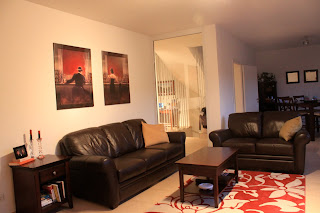Friday, February 26, 2010
America, Here I Come
Wednesday, February 24, 2010
Wurm Alert
Today, on our morning walk, Boston had some abnormality (I'll leave the disgusting details out...you're welcome). Unfortunately, she has worms - that is for certain. The vet on base could not fit us in for over a week and to treat her, required a stool sample. Ew. I was worried about her going so long with medicine AND was not thrilled about the stool sample. I decided to take my matter to the Germans.
Went home, googled, “Tierartze Trier,” (animal doctor in Trier) and turns out, there was one only 7km away, a MUCH closer alternative to base. I called, only after looking up how to converse my problem. The tierartze spoke very little English - my extra work came in handy! I got my point across after speaking Gerglish (a conglomeration of English & German) and immediately went in to pick up the meds. No stool sample required – success! After a minor mix-up with Boston’s weight (I always give it in pounds, not kilograms), I learned it is pretty likely Riva has the same thing. I bargained the tierartze down to buy one, get one half off, something I could NEVER have done on base! So, not only did I get an immediate medication, I didn’t have to take Boston in for an appointment (no appointment fee – frei!), didn’t have to drive all the way to base, didn’t have to collect a stool sample OR pay for the testing of it. I am loving the German way more and more everyday.
Living in Blacksburg for forever, it's always been who you know. Here, it's a different story. It's not who you know, it's how much of the German language you know. While my skill-set is minimal at best, a small vocabulary learned mainly from Rosetta Stone and additional pronunciation practice and confidence from my German class, I knew just enough to make it through another German adventure. Keep ‘em coming.
Monday, February 22, 2010
Tomato/Tomato, Potato/Potato, and other Pronunciation Frustrations
Pronunciation Frustration Einz: “Shootin Abend:” To make a long story short on how this instance even came about, a waitress taught me that it is not proper to say Guten Abend, when leaving a restaurant at night. Guten abend is the equivalent of Good Evening. Instead, she tells me, one should say, Shootin Abend (or so I thought). Me, being proud of my new German phrase, decide to use it the next night at dinner with Axel and his family (keep in mind I am with 3 Germans – 2 of which basically speak fluent English). As I’m leaving, I say, “Shootin Abend.” Laughs all around. What? What did I say? They have NO idea what I’m talking about. So I explain that the waitress told me to say it when I’m leaving, etc. More laughs. They inform me that she was just messing with me. HA! Okay, I can laugh as a good joke when I hear one, making fun of the foreigner, I get it. Funny. Axel finds this SO very funny that he is saying it over and over again, making fun of me! Picture this: Speedo-wearing Axel cracking up at my misfortune (or my mispronunciation – whatever you want to call it), cigarette in mouth, sticking out his feet, pretending to “shoot” them (SHOOTIN abend) with his pretend hand guns (Okay, okay, I admit it. He was not in a speedo, but that WOULD make for a better story). I leave that night thinking there is no such phrase as “have a good night” in German, joke was on me, funny Germans. Come to find out later, “Schönen abend,” pronounced SHOONEN not SHOOTEN abend, means have a good night.** My three German neighbors who almost all speak fluent English have NO IDEA what I’m talking about when I pronounce one consonant wrong. Hm. Really? Was this just a one time, fluke thing that happened? I wish.
Pronunciation Frustration Zwei: “Schitte Einz:” This last pronunciation frustration really threw me over the edge, hence the entire blog-post about the Germans and their particulars with pronunciations. For my German class, I needed a buy a certain textbook. The teacher assured us any of the bookstores in the city would have or order the book for us. After class, I went to the closest locally owned bookstore (buchhandlung), spoke with owner, and said, “Haben Sie dieses buch?” and pointed to the title and ISBN number. In German, he told me he did not have it but could order it and it would arrive tomorrow (morgen). Deal. I gave him my name (spelling it using the German alphabet pronunciation– proud moment) and told him I would see him tomorrow to pick up my book. Jump ahead 24 hours, I return to the same buchhandlung after looking up how to say, “I ordered this book yesterday,” in German (I like to think of myself as a thoughtful foreigner, trying to inconvenience people as little as possible), and encounter the very same man who helped me the day before. I sigh with relief and think whew, he will remember me, no communication problem, easy as pie. Wrong. I say, in German, “I ordered the book Schritte Einz yesterday. My name is Casey Rapalje.” He stares at me with an open mouth and says nothing. I repeat myself, pronouncing the book, SCHREET EINZ. Again, he looks at me as if I’m a complete and utter moron. Finally, after repeating myself for a THIRD TIME, he says “OOOHHH Schritte Einz, ja.” He pronounces the book SCHFRITT einz, not SCHREET einz.** Seriously? I was ONE VOWEL OFF AND HE HAS NO IDEA WHAT I’M TALKING ABOUT?! Really? I mean, cut me a break. I’m ordering an elementary school book to learn the German language! Can’t you cut me some slack? I pronounced only one vowel wrong. Finally, he gives me my book and I go on my un-merry way, absolutely steaming with frustration and very discouraged.
Unfortunately, this sort of thing has not happened only twice. My pronunciation frustrations are countless. Although I am currently unaware of any auricular anatomical differences that exist between Germans and Americans, it is now obvious to me, that in order for the Germans to hear and understand you, you have to speak perfectly. As Americans, we do the opposite and still wind up with a bad rap. Give me 5 out of 10 words in a sentence, pronounced wrong, and I can figure out what you’re saying. Americans are supposedly insensitive to foreigners? I beg to differ. Until you live in a foreign country, until you are a foreigner, and until you know how other countries treat their foreigners and their lack of language skills, you cannot judge the US of A. In actuality, we cater to those whose first language is not English.
** Note: I really wish, as readers, you could HEAR me pronounce these few words, my way versus the correct way. The difference is absolutely minimal, like tomato/tomato, potato/potato.
Friday, February 19, 2010
Whatever You Want to Call It



Wednesday, February 17, 2010
Ciao, Venezia







Tuesday, February 16, 2010
Wednesday, February 10, 2010
The Melting Pot
Tuesday, February 9, 2010
Shut Down
Monday, February 8, 2010
Saturday, February 6, 2010
Hard Workin' Space Cowboy

Friday, February 5, 2010
die Toilette Fakten
- The two key phrases everyone needs to know:
- Never, I mean never, spend your 50euro cent pieces. Save them all up for the bathrooms. The majority of the toilettes (gas stations, public toilets, etc) in Europe cost. Ladies, I promise, the price is worth it. Gentlemen, I can't say either way. But the last thing in the world you want is to really need to go, have no change to do so, and be unable to communicate (in German) the complete and utter emergency you are experiencing.
- 'Dusche' in German = 'Shower in English.' This creates instant jokes for some Americans, including my husband, who now, as an insult/joke will sometimes call you a 'showerbag.'
- When in the presence the Germans, or just Europeans in general, if you excuse yourself to the 'bathroom,' jokes will immediately ensue. To the Europeans, using the bathroom is using the actual bathtub. They will begin joking about how and why you need to bathe in the middle of dinner or whatever event you're in the midst of. Instead, excuse yourself to the 'toilet.' This will save you from being the butt of many jokes.















